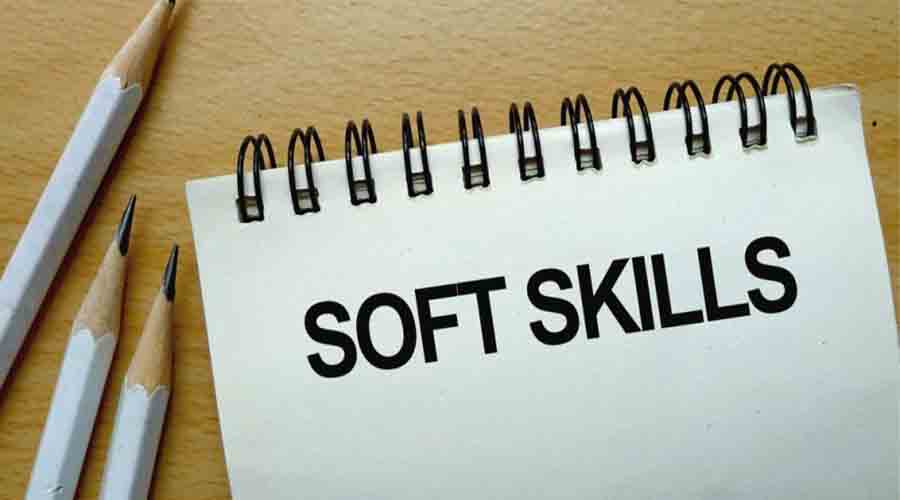Soft skills are personality and behavioral traits that will help a candidate get hired and succeed in a job. Unlike technical or “hard” skills, soft skills are interpersonal and behavioral skills that help you work well with others and advance your career. In this article, let's join Giaiphapdonggoi.net to learn about what soft skills are and Why are soft skills important?
Table of Contents [Hide]
1. What are soft skills?

What are soft skills?
Soft skills are intangible and non-technical abilities sought from candidates. Eg:
Contact.
Work in team.
Problem solving.
Leadership.
Mission.
Soft skills are sometimes referred to as transferable or technical skills.
As the term implies, these are less specialized skills, less rooted in specific jobs, and more suited to a candidate's overall personality and character.
Soft skills involve your attitude and intuition. Since soft skills are less about your qualifications and more about personality, it is important to consider what your soft skills are and how you can show evidence of them before applying for a job.
This is especially true of the recruitment process for graduate programs, where transferable skills and potential often take precedence over professional experience.
2. Why are soft skills important?

Why are soft skills important?
Soft skills are the difference between the right candidate and the ideal candidate.
In most competitive job markets, hiring criteria are not limited to technical ability and specialized knowledge.
Every job role requires some interaction with other people, whether they are colleagues or clients, so soft skills will be important to most employers.
Earlier in your career, employers will be looking for people with leadership potential.
They won't expect you to have all the qualifications and experience from day one, but they will need to know that you have the qualities that will allow you to learn and grow in the role.
Here are some examples of soft skills differences:
A doctor is required to have many hard skills, especially the ability to diagnose and prescribe treatment for a wide range of diseases. But a doctor who doesn't have the soft skills of emotional intelligence, is trustworthy, and is approachable won't be appreciated by their patients.
A salesperson, who may have unparalleled and complete knowledge of their market, will find it difficult to strike deals and retain customers if they lack soft skills in terms of communication and negotiation skills. between individuals.
A customer service professional with great organizational skills will only work well if they can also interact professionally with customers, and have empathy and listening skills.
Soft skills are not only important when dealing with customers and external customers. They are equally important when it comes to interacting with co-workers.
Employers value soft skills because they enable people to function and thrive in teams and organizations at large.
A productive and healthy work environment depends on soft skills. After all, the workplace is an interpersonal space where relationships must be built and nurtured, views must be exchanged, and sometimes, conflicts must be resolved.
>> Learn more about cheap pet straps in Dong Nai in Dong Nai
3. Ten Key Soft Skills

Ten key soft skills
Communication is one of the most important soft skills. Capable communicators can tailor their tone and style to their audience, understand and act effectively on instructions, and explain complex issues to colleagues and clients. A lot of business communication these days is done by email, so it's important to know good email rules and give clear and concise instructions.
Self-motivation: Having a positive and proactive attitude to work well without supervision around the clock is an important soft skill for any employee. It not only demonstrates reliability and commitment, but also shows that you can effectively fit into an organizational structure without the need for constant monitoring.
Leadership: is a soft skill that you can demonstrate even when you are not directly managing others. People with strong leadership skills will have the ability to inspire others and lead the team to success. This was why it was a particularly sought-after skill.
Responsibility: is a soft skill that is rarely mentioned but highly valued. This means that you have to be proactive in improving, accept responsibility for any setbacks, and be genuinely interested in working your way up to success.
Teamwork: Working in a group
Working towards a common goal requires intuition and interpersonal acumen to know when to be a leader and when to be a listener. Good team players are aware of and receptive to the needs and responsibilities of others.
Problem solving requires not only analytical, creative and critical skills, but also a specific mindset; Those who can approach problems with a sober and classy head will often achieve a more effective solution than those who cannot.
Assertiveness is characterized by the ability to make quick and effective decisions. An assertive employee takes effective and well-considered action, especially when under pressure. They take responsibility for the consequences of their decisions and can adapt when they make mistakes. This ensures that opportunities are not missed by lengthy analysis or debate.
Ability to work under pressure and manage time: Many jobs come with demanding deadlines and sometimes, high stakes. Employers award candidates who demonstrate an assertive attitude, the ability to think clearly, and the ability to prevent and put stress aside.
Flexibility is an important soft skill, as it demonstrates the ability and willingness to take on new tasks and new challenges calmly and without fuss. Flexible employees are available to help when needed, take on additional responsibilities, and can adapt quickly when plans change.
Negotiation and Conflict Resolution: This is one of the soft skills that employers look for in potential leaders. Being an adept negotiator is about persuading and influencing, and keenly seeking a win-win solution.
While hard skills are important for completing technical tasks, solid soft skills will make you the type of employee that companies want to hire, keep, and promote. It's important to highlight the soft skills you have at all stages of the job search and to continue developing those skills after you find the job you're looking for.
See more articles on the same topic:
What are teamwork skills? Why are teamwork skills important?
What are KPIs? Types of KPIs and how to develop KPIs

























































































































































































































































































































































